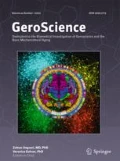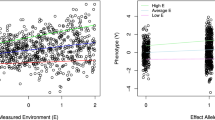Abstract
Polygenic risk scores (PRSs) discriminate trait risks better than single genetic markers because they aggregate the effects of risk alleles from multiple genetic loci. Constructing pleiotropic PRSs and understanding heterogeneity, and the replication of PRS-trait associations can strengthen its applications. By using variational Bayesian multivariate high-dimensional regression, we constructed pleiotropic PRSs jointly associated with body mass index, systolic and diastolic blood pressure, total and high-density lipoprotein cholesterol in a sample of 18,108 Caucasians from three independent cohorts. We found that dissecting heterogeneity associated with birth year, which is a proxy of exogenous exposures, improved the replication of significant PRS-trait associations from 37.5% (6 of 16) in the entire sample to 90% (18 of 20) in the more homogeneous sample of individuals born before the year 1925. Our findings suggest that secular changes in exogenous exposures may substantially modify pleiotropic risk profiles affecting translation of genetic discoveries into health care.



Similar content being viewed by others
Data availability
This manuscript was prepared using a limited access datasets obtained through dbGaP, accession numbers: phs000287.v5.p1 (CHS), phs000007.v28.p10 (FHS), and phs000428.v1.p1 (HRS). Phenotypic HRS data are available publicly and through restricted access from http://hrsonline.isr.umich.edu/index.php?p=data.
Correspondence and requests for materials should be addressed to Yury Loika (yury.loika@duke.edu), Irina Irincheeva (iirincheeva@gmail.com), and Alexander M. Kulminski (alexander.kulminski@duke.edu).
References
Begum F, Ghosh D, Tseng GC, Feingold E. Comprehensive literature review and statistical considerations for GWAS meta-analysis. Nucleic Acids Res. 2012;40:3777–84. https://doi.org/10.1093/nar/gkr1255.
Bipolar D, Schizophrenia Working Group of the Psychiatric Genomics Consortium. Electronic address drve, Bipolar D, Schizophrenia Working Group of the Psychiatric Genomics C. Genomic dissection of bipolar disorder and schizophrenia, including 28 subphenotypes. Cell. 2018;173:1705–1715.e1716. https://doi.org/10.1016/j.cell.2018.05.046.
Boyle EA, Li YI, Pritchard JK. An expanded view of complex traits: from polygenic to omnigenic. Cell. 2017;169:1177–86. https://doi.org/10.1016/j.cell.2017.05.038.
Button KS, Ioannidis JP, Mokrysz C, Nosek BA, Flint J, Robinson ES, et al. Power failure: why small sample size undermines the reliability of neuroscience. Nat Rev Neurosci. 2013;14:365–76. https://doi.org/10.1038/nrn3475.
Chatterjee N, Shi J, Garcia-Closas M. Developing and evaluating polygenic risk prediction models for stratified disease prevention. Nat Rev Genet. 2016;17:392–406. https://doi.org/10.1038/nrg.2016.27.
Citron BA, Davis MD, Milstien S, Gutierrez J, Mendel DB, Crabtree GR, et al. Identity of 4a-carbinolamine dehydratase, a component of the phenylalanine hydroxylation system, and DCoH, a transregulator of homeodomain proteins. Proc Natl Acad Sci U S A. 1992;89:11891–4. https://doi.org/10.1073/pnas.89.24.11891.
Cupples LA, Heard-Costa N, Lee M, Atwood LD. Genetics analysis workshop 16 problem 2: the Framingham Heart Study data. BMC Proc. 2009;3(Suppl 7):S3.
Das S, et al. Next-generation genotype imputation service and methods. Nat Genet. 2016;48:1284–7. https://doi.org/10.1038/ng.3656.
Dawber TR, Meadors GF, Moore FE Jr. Epidemiological approaches to heart disease: the Framingham Study. Am J Public Health Nations Health. 1951;41:279–81. https://doi.org/10.2105/ajph.41.3.279.
Delaneau O, Marchini J, Zagury JF. A linear complexity phasing method for thousands of genomes. Nat Methods. 2011;9:179–81. https://doi.org/10.1038/nmeth.1785.
Feinleib M, Kannel WB, Garrison RJ, McNamara PM, Castelli WP. The Framingham Offspring Study. Design and preliminary data. Prev Med. 1975;4:518–25. https://doi.org/10.1016/0091-7435(75)90037-7.
Fried LP, et al. The Cardiovascular Health Study: design and rationale. Ann Epidemiol. 1991;1:263–76.
Govindaraju DR, et al. Genetics of the Framingham Heart Study population. Adv Genet. 2008;62:33–65. https://doi.org/10.1016/S0065-2660(08)00602-0.
Grossmann C, Gekle M. New aspects of rapid aldosterone signaling. Mol Cell Endocrinol. 2009;308:53–62. https://doi.org/10.1016/j.mce.2009.02.005.
Hamosh A, Scott AF, Amberger JS, Bocchini CA, McKusick VA. Online Mendelian Inheritance in Man (OMIM), a knowledgebase of human genes and genetic disorders. Nucleic Acids Res. 2005;33:D514–7. https://doi.org/10.1093/nar/gki033.
Juster FT, Suzman R. An overview of the health and retirement study. J Hum Resour. 1995;30:S7–S56.
Kathiresan S, et al. Common variants at 30 loci contribute to polygenic dyslipidemia. Nat Genet. 2009;41:56–65. https://doi.org/10.1038/ng.291.
Khera AV, et al. Genome-wide polygenic scores for common diseases identify individuals with risk equivalent to monogenic mutations. Nat Genet. 2018;50:1219–24. https://doi.org/10.1038/s41588-018-0183-z.
Kulminski AM. Unraveling genetic origin of aging-related traits: evolving concepts. Rejuvenation Res. 2013;16:304–12. https://doi.org/10.1089/rej.2013.1441.
Kulminski AM, et al. Pleiotropic associations of allelic variants in a 2q22 region with risks of major human diseases and mortality. PLoS Genet. 2016;12:e1006314. https://doi.org/10.1371/journal.pgen.1006314.
Liu C, et al. Meta-analysis identifies common and rare variants influencing blood pressure and overlapping with metabolic trait loci. Nat Genet. 2016;48:1162–70. https://doi.org/10.1038/ng.3660.
Locke AE, et al. Genetic studies of body mass index yield new insights for obesity biology. Nature. 2015;518:197–206. https://doi.org/10.1038/nature14177.
Maher B. Personal genomes: the case of the missing heritability. Nature. 2008;456:18–21. https://doi.org/10.1038/456018a.
Maier R, et al. Joint analysis of psychiatric disorders increases accuracy of risk prediction for schizophrenia, bipolar disorder, and major depressive disorder. Am J Hum Genet. 2015;96:283–94. https://doi.org/10.1016/j.ajhg.2014.12.006.
Manolio TA, et al. Finding the missing heritability of complex diseases. Nature. 2009;461:747–53. https://doi.org/10.1038/nature08494.
Paquette M, Chong M, Theriault S, Dufour R, Pare G, Baass A. Polygenic risk score predicts prevalence of cardiovascular disease in patients with familial hypercholesterolemia. J Clin Lipidol. 2017;11:725–732.e725. https://doi.org/10.1016/j.jacl.2017.03.019.
Ruffieux H, Davison AC, Hager J, Irincheeva I. Efficient inference for genetic association studies with multiple outcomes. Biostatistics. 2017;18:618–36. https://doi.org/10.1093/biostatistics/kxx007.
Schaub MA, Boyle AP, Kundaje A, Batzoglou S, Snyder M. Linking disease associations with regulatory information in the human genome. Genome Res. 2012;22:1748–59. https://doi.org/10.1101/gr.136127.111.
Scott JG, Berger JO. Bayes and empirical-Bayes multiplicity adjustment in the variable-selection problem. Ann Stat. 2010;38:2587–619. https://doi.org/10.1214/10-Aos792.
Sivakumaran S, et al. Abundant pleiotropy in human complex diseases and traits. Am J Hum Genet. 2011;89:607–18. https://doi.org/10.1016/j.ajhg.2011.10.004.
Splansky GL, Corey D, Yang Q, Atwood LD, Cupples LA, Benjamin EJ, et al. The third generation cohort of the National Heart, Lung, and Blood Institute’s Framingham Heart Study: design, recruitment, and initial examination. Am J Epidemiol. 2007;165:1328–35. https://doi.org/10.1093/aje/kwm021.
Stockand JD. New ideas about aldosterone signaling in epithelia. Am J Physiol Ren Physiol. 2002;282:F559–76. https://doi.org/10.1152/ajprenal.00320.2001.
Teslovich TM, et al. Biological, clinical and population relevance of 95 loci for blood lipids. Nature. 2010;466:707–13. https://doi.org/10.1038/nature09270.
Tibshirani R. Regression shrinkage and selection via the lasso. J Roy Stat Soc B Met. 1996;58:267–88.
Torkamani A, Wineinger NE, Topol EJ. The personal and clinical utility of polygenic risk scores. Nat Rev Genet. 2018;19:581–90. https://doi.org/10.1038/s41576-018-0018-x.
Visscher PM, Yang J. A plethora of pleiotropy across complex traits. Nat Genet. 2016;48:707–8. https://doi.org/10.1038/ng.3604.
Weber KT. Heart-hitting tales of salt and destruction. J Lab Clin Med. 2000;136:7–13. https://doi.org/10.1067/mlc.2000.107301.
Werner ER, Blau N, Thony B. Tetrahydrobiopterin: biochemistry and pathophysiology. Biochem J. 2011;438:397–414. https://doi.org/10.1042/BJ20110293.
Willer CJ, Li Y, Abecasis GR. METAL: fast and efficient meta-analysis of genomewide association scans. Bioinformatics. 2010;26:2190–1. https://doi.org/10.1093/bioinformatics/btq340.
Willer CJ, et al. Discovery and refinement of loci associated with lipid levels. Nat Genet. 2013;45:1274–83. https://doi.org/10.1038/ng.2797.
Wynn TA, Vannella KM. Macrophages in tissue repair, regeneration, and fibrosis. Immunity. 2016;44:450–62. https://doi.org/10.1016/j.immuni.2016.02.015.
Yang J, Zeng J, Goddard ME, Wray NR, Visscher PM. Concepts, estimation and interpretation of SNP-based heritability. Nat Genet. 2017;49:1304–10. https://doi.org/10.1038/ng.3941.
Funding
This research was supported by Grants No P01 AG043352, R01 AG065477, and R01 AG047310 from the National Institute on Aging. The funders had no role in study design, data collection and analysis, decision to publish, or preparation of the manuscript. The content is solely the responsibility of the authors and does not necessarily represent the official views of the National Institutes of Health. See also Supporting Acknowledgment Text in Online Resource 15.
Author information
Authors and Affiliations
Contributions
AMK conceived and designed the experiment, planned the analyses, and wrote the paper; YL prepared data, designed the experiment, planned and performed statistical analyses, and wrote the paper; II designed the experiment, planned and performed statistical analyses, and wrote the paper; IK performed bioinformatic analysis and wrote the paper; AN prepared and imputed genetic data.
Corresponding authors
Ethics declarations
Conflict of interest
The authors declare that they have no conflict of interest.
Additional information
Publisher’s note
Springer Nature remains neutral with regard to jurisdictional claims in published maps and institutional affiliations.
Electronic supplementary material
About this article
Cite this article
Loika, Y., Irincheeva, I., Culminskaya, I. et al. Polygenic risk scores: pleiotropy and the effect of environment. GeroScience 42, 1635–1647 (2020). https://doi.org/10.1007/s11357-020-00203-2
Received:
Accepted:
Published:
Issue Date:
DOI: https://doi.org/10.1007/s11357-020-00203-2




